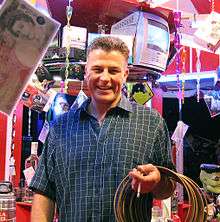Showman
Showman can have a variety of meanings, usually by context and depending on the country.
| Look up showman in Wiktionary, the free dictionary. |
Australia
Travelling showmen are people who run amusement and side show equipment at regional shows, state capital shows, events and festivals throughout Australia. In the past, it has also been used for the people who organized freak shows, sideshows, circuses, travelling theatre troupes and boxing tents.
In Australia, there are around 500 travelling show families, Australian travelling show families in the Eastern states have a travelling School that has approximately 90 children.
Ireland
Family names associated with funfairs in Ireland include Fox-McFadden, Cassells, Cullen, McFadden, Bird, Perks and Bell. Turbetts, Hudsons, McCormacks, McGurk, Wilmots and Grahams are associated with coastal amusements, particularly in the west of the country.[1]
Norway
"Showman" is a humoristic talkshow hosted by the Norwegian comedian and actor Håvard Lilleheie. The show currently runs on TV2 Zebra, and is produced by Monster Entertainment.
Turkey
"Showman" ("şovmen" in Turkish) word refers to talk show host in Turkey. This show can be performed individually (talking with public by telephone) in Turkish TV's.

United Kingdom
In the United Kingdom, Funfair Travellers are families involved with funfairs and circuses. The Showmen's Guild of Great Britain is the most dominant trade association, with a membership of around 4,700. The head of the family being the member [2] For example, the Guild co-organizes St Giles' Fair in Oxford with Oxford City Council each September. The Association of Independent Showmen and Society of Independent Roundabout Proprietors are two other Showman trade associations.
Due to travelling, the majority of British Showmen have English, Scottish, Welsh and even Irish heritage, as well as heritage from English Romanichal Travellers and Irish Travellers due to marriages between the different Travelling communities.
Most Showman’s Heritage goes back generations all following in the foot steps of their parents, showmen know each other all over the UK due to the nature of the business Travelling from one fair to the next over generations.
The children often work alongside of their parents learning all aspects of the business, this has been like this for generations, close bonds are formed.
Most Showmen marriages happen within the community, having their own language, traditions with most having generations of lineage of Showmen, Showmen are viewed as and self identify as a cultural group. They are not recognised as an ethnic group though due to Showmen being more of an occupation than an ethnicity, also as the group has drawn upon many other ethnicities and since many families are joining and leaving the group, it cannot be considered an ethnicity.
Showman generally get along well with the UK’s other Traveller communities (Most notably Romanichal Travellers and Irish Travellers). Marriages between different Traveller communities aren’t uncommon.
United States
Showmen in the United States are also male dancers or performers in shows, usually alongside showgirls; an example would be Gene Kelly in the film Singin' in the Rain.
The term showman or show people, can also be meant as a superlative or complimentary term, sometimes as an accolade or quasi-title, such as in the documentary name Harry Saltzman: Showman.
See also
References
- "Irish Arks and Waltzers Part 1 - 1990 to Present Day". The University of Sheffield – National Fairground Archive. Archived from the original on 2011-12-22. Retrieved 01-06-2012. Check date values in:
|accessdate=(help) - Showmen's Guild of Great Britain Central Office.